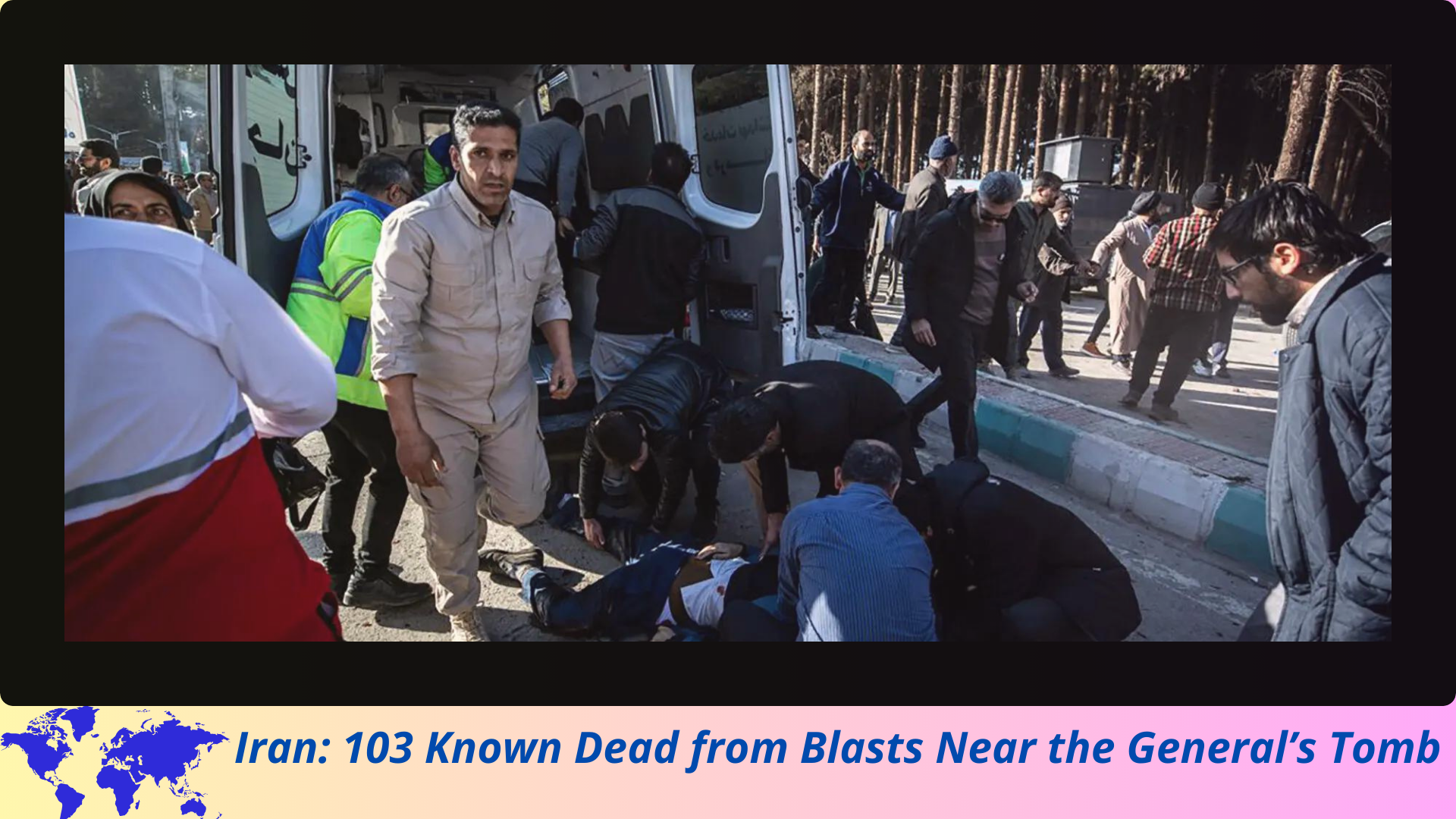The explosions happened at a memorial service for Qassim Suleimani, the senior commander who was murdered four years ago by an American drone strike.
According to Iranian officials, two explosions that occurred on Wednesday at a memorial service for Iran’s former top military commander, Qassim Suleimani, killed at least 103 people and injured 171 more. A day after an explosion in a Beirut, Lebanon, neighborhood claimed the lives of numerous Hamas officials, the explosions caused dread and mourning throughout Iran and increased tensions throughout the region.
A parade of people was heading to the cemetery in Kerman, Iran, to mark the four-year anniversary of General Suleimani’s killing by the United States when two explosives hidden in bags detonated, according to Iranian authorities speaking to state TV. According to the officials, the bags seemed as though they were set off by remote control, scattering the victims around the floor.
The death toll was expected to grow because of the explosions’ massive scope, which the official media referred to as a terrorist act.
State media released images and videos of the explosions’ aftermath, which featured extensive mayhem and devastation, sirens ringing, and injured people, some of whom were children, falling to the ground. Many of the injured cried out, bloodied, “God help us.” Everyone perishes.
Videos taken just before the explosions showed a sizable throng of people strolling along a street adorned with flags, food and drink vendors, with Quranic prayers playing over speakers. A massive explosion then shook the region. Videos showed people scattering in all directions as the air filled with screaming.
The spokesperson for the nation’s emergency assistance efforts, Babak Yektaparast, stated, “Unfortunately, many of the injured people are in critical condition.” He stated that all of the province of Kerman’s medical institutions were ready to receive patients, and that emergency planes were being used to transport patients to hospitals in Tehran.
Gholamhossein Mohseni-Ejei, the head of Iran’s judiciary, announced that all of the nation’s security, intelligence, and military agencies were being called upon to identify the perpetrator of the blasts.
Ahmad Vahidi, Iran’s interior minister, stated on state television that the second explosion, which happened minutes after the first and occurred at a place where people had gathered to assist the injured, was responsible for the majority of the deaths. He claimed that the military and security services currently had control of the situation in the city of Kerman.
Mr. Vahidi declared, “We will God willingly deliver a big slap to those responsible for this terrorist attack.” “They are misguided to believe that such cowardly attacks will weaken our resolve.”
The explosions occurred four years after General Suleimani, the strong Quds Force commander of the Iranian Revolutionary Guards Corps, was killed at Baghdad airport by an American drone attack.
For creating and arming a network of regional proxy militias under Tehran’s leadership that opposed Israel and the United States throughout the Middle East, General Suleimani was acclaimed as a hero both in Iran and in some areas of the broader region. Among Iranians who support the regime, he still enjoys a standing that is almost legendary. Official estimates state that over a million people attended his burial in 2020. On the anniversary of his murder, some Iranians celebrate him with processions and celebrations each year.
The Arabic-speaking General Suleimani became the face of Iran’s Shiite axis of influence, which significantly altered Middle East geopolitics for years to come, by developing intimate personal relationships with the leaders of allies around the region. The Islamic State, an extremist organization that seized control of vast regions of Syria and Iraq in the middle of the 2010s, was ultimately vanquished with the aid of the Syrian and Iraqi militias he helped form.
Hezbollah, the armed political party that rules most of Lebanon, and Hamas, the military and political organization that governs Gaza, were among the regional allies that General Suleimani financed and equipped. While Hamas fights Israel in Gaza, Hezbollah and Israeli soldiers have been engaged in combat along Lebanon’s southern border.
The names of individuals who passed away in Iran on Wednesday are yet unknown.
On social media, a few Iranians were criticizing the government and regional security personnel for their inability to arrange such a prominent event. The same route where the blasts on Wednesday occurred was the scene of a stampede that claimed 60 lives in 2020 at General Suleimani’s burial.

